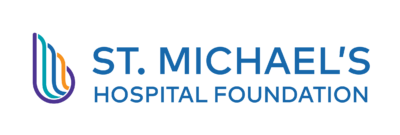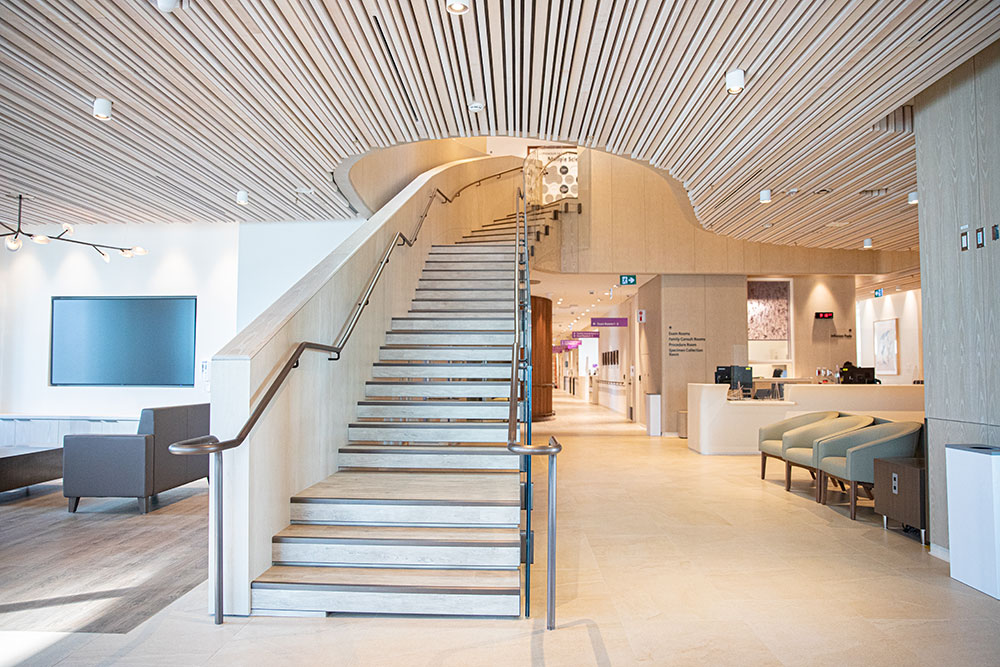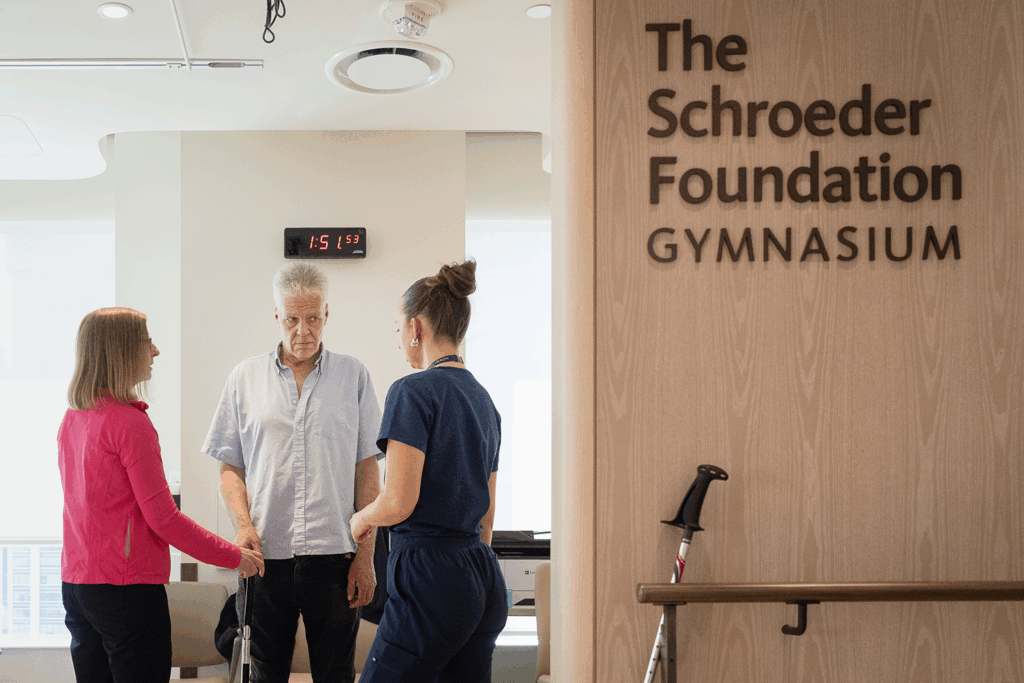Multiple Sclerosis

The BARLO MS Centre
The BARLO Multiple Sclerosis (MS) Centre at St. Michael’s Hospital is one of the largest of its kind in North America. Our world-class clinician-scientists are working to revolutionize the understanding and treatment of MS.
As a patient, you will be cared for by a compassionate team of neurologists, nurses, occupational and physical therapists, pharmacists, social workers and more. You will be surrounded by soaring views and award-winning architecture designed to make your stay accessible and customized to your needs.
To learn more about the clinic and MS, please visit the BARLO MS Centre website.
Multiple Sclerosis at St. Michael's Hospital
Please see below for important information for new and existing patients.
30 Bond St. – Peter Gilgan Tower- 16th floor
The closest entrance to the MS Clinic is on Queen Street, just east of Victoria Street. Take the elevator from the main lobby of the Peter Gilgan Tower (PGT).
416-864-5377
Fax: 416-864-5378
Monday to Friday, 8 a.m. to 4 p.m.
- To refer a patient, please use this referral form.
We recommend that patients with MS receive influenza vaccination with the flu shot annually, unless there is a specific contraindication (e.g., prior severe reaction).
FluMist® is a live-virus flu vaccine (sometimes called LAIV for “live attenuated influenza vaccine”) that is delivered via a nasal spray. This live-virus vaccine is not recommended for people with MS.
Patients with MS who are experiencing a relapse including those receiving steroids should wait at least four weeks before receiving their flu shot.
What is a relapse?
A relapse, also called an attack or exacerbation, leads to new or worsening neurological symptoms lasting at least 24 to 48 hours due to new inflammation in the central nervous system, with no fever or infection.
A pseudo-relapse can cause temporary worsening of prior symptoms due to things like an illness, infection, stress, or getting too hot, without new inflammation in the central nervous system.
If you are having a relapse, you may have symptoms like:
- Vision loss
- Double vision
- Numbness/tingling
- Weakness of your arms or legs
- Clumsiness of your arms or legs
- Feeling off balance
- Trouble walking

What should I do if I think I am having a relapse?
- If you have a fever or infection, go to your family doctor, an urgent care clinic, or an Emergency Department (ED). They can evaluate for infection or systemic illness causing a pseudo-relapse.
If I am not a patient of the MS Clinic at St. Michael’s Hospital?*
- If you do not have a fever or infection and your symptoms continue or get worse for more than 24 to 48 hours, contact your neurologist.
- If you have severe symptoms such as blindness, inability to walk, severe weakness, or if you cannot reach your doctor and are concerned about ongoing worsening, go to the ED.
If I am a patient of the MS Clinic at St. Michael’s Hospital?
- If you do not have a fever or infection and your symptoms continue or get worse for more than 24 to 48 hours, contact the MS Clinic Symptom Reporting Line at 416-864-5333 and leave a message. All messages are screened by a nurse and returned in order of priority.
- If you have severe symptoms such as blindness, inability to walk, severe weakness, or if you cannot reach a nurse or your doctor and are concerned about ongoing worsening, go to the ED.
What happens after I talk to a nurse on the MS Symptom Reporting Line?
The nurse will talk to your neurologist or another neurologist who is on call.
We may ask you to come in to see either your neurologist, a nurse practitioner or another doctor in the relapse clinic.
*The MS Clinic at St. Michael’s can only respond to people who are registered patients in the clinic.
How will you treat my relapse?
If your relapse is mild, we will watch and see if your symptoms improve on their own without any treatment.
If your relapse is affecting your day-to-day function, we may suggest high dose steroids to help decrease the inflammation in your central nervous system, as long as an infection is ruled out.
What do steroids do?
Steroids decrease inflammation in your central nervous system and speed up recovery from a relapse. However, steroids are not proven to change the final level of recovery and are therefore not necessary for every relapse.
How are steroids given?
Steroids can be given by intravenous infusion or by mouth, and are usually given for 3 to 5 days.
What are the side effects of steroids?
Though steroids are usually safe to take for short periods of time, some side effects can include:
- Difficulty sleeping
- Mood changes
- Upset stomach
- Acne
- Lower immunity which can increase the risk of infections
- High blood pressure or blood sugar
- Bone damage (this is rare but can be serious)
If you need steroids often or for a longer period of time, there may be additional side effects like loss of bone density, diabetes, changes in fat distribution (like rounding of the face), thin skin, stomach ulcers or eye problems.
What if steroids don’t work?
Symptoms of a relapse may not completely resolve even with steroids, but relapse symptoms usually improve to a certain extent with time.
If your symptoms are severe (for instance, if you are unable to see or walk) and do not go away, your neurologist may admit you to the hospital for other treatments.
Disease Modifying Therapy for MS
Our team may discuss Disease Modifying Therapy (DMT) options with you. DMT options may include oral, injectable, or infusion therapies.
DMTs for relapsing remitting MS help reduce the chance of new MS relapses and new lesions in your brain and spinal cord on MRI. These therapies may also decrease the risk of accumulating disability from RRMS.
DMTs for primary or secondary progressive MS may help decrease the rate of progression of your MS symptoms.
DMT coverage can be obtained through a private drug plan and/or through the public Trillium Drug Program in Ontario.
Please apply for the Trillium Drug Program if:
- You are planning to start DMT for MS now or in the future AND
- You do not have a private drug plan OR your private drug plan does not adequately cover the cost of your prescription medications.
The Trillium Drug Program is available for Ontario residents who have high prescription drug costs in relation to their net household income. DMTs for MS can be costly BUT a significant portion of the cost can often be covered for patients who are part of the Trillium Drug Program.
To apply online please visit the Trillium Drug Program.
Trillium Drug Program Application Forms and Guides are available at local pharmacies, online, or by calling 416-642-3038 or 1-800-575-5386 (toll free).
What should I do before my first appointment?
Here are some helpful tips:
- You will get an automated phone call reminder 1 week before your appointment.
- If your MRI was done outside of St. Michael’s Hospital, send us the images. If your images are stored on PocketHealth, you can email them to us at msclinicforms@unityhealth.to (see Other resources below). Otherwise, bring your images on a CD.
- Make a list of your concerns, symptoms or questions.
What should I bring to my first appointment?
When you come for your appointment, wear comfortable clothing and footwear and remember to bring:
- Your Ontario Health card (OHIP).
- A pen and some paper in case you want to take notes.
- A list of all your medicines, pharmacy phone and fax numbers.
- Your immunization (vaccine) records.
- Your dentures, eyeglasses and any walking aids you may have.
What will happen at my first appointment?
When you come for your first visit:
- You will see a neurologist, and possibly a nurse practitioner or medical trainee. For more information on our team, see Your MS team below.
- We will ask about your medical history and any medicines you take.
- We will examine you and review any MRI images and other test results you have.
- We will work together to build a plan and talk about what happens next.
- We may order more blood tests and book an MRI or an evoked potential test for another day.
- You may also see a clinic nurse, occupational therapist, physiotherapist, or pharmacist. For a full list of the health care team and their roles, see Your MS team below.
If you have to cancel or reschedule your appointment, call 416-864-5377 between 8:30 a.m. and 4 p.m., Monday to Friday. Please give us at least one week’s notice if you need to change your appointment.
Getting MRIs from outside facilities
MRI images obtained outside of St. Michael’s Hospital should be sent to our clinic so they can be uploaded and viewed by your neurologist. To retrieve your images, please contact the hospital where the MRI was obtained. The process may include:
- PocketHealth: Electronic system to share MRI results
- Visit health/en-US/and sign up
- Share all your records by email to msclinicforms@unityhealth.to in advance of the visit
- Please confirm receipt by the front desk
- CD: Provide to the front desk at check in.
What do I bring to follow-up appointments?
When you come for your appointment, remember to bring:
- Your Ontario Health card (OHIP).
- A list of your current medicines, pharmacy phone and fax numbers.
- A list of any new immunizations (vaccines) and their dates.
- Your eyeglasses.
- A family member or friend if you wish (ask about our policy when we call to confirm your appointment).
How do I renew my prescriptions?
Get your pharmacy to fax a renewal request to us at 416-864-5378 at least 2 weeks before you are due to run out.
Depending on the medicines you take, you may need to:
- Have bloodwork done before your neurologist can renew your prescription.
- Call your specialty pharmacy if your medicines come from there (for example, McKesson, Bioscript).
- Contact the patient support program responsible for your treatment if you require assistance.
Who do I contact if I have medical forms that need to be completed?
Your family doctor can complete most of your forms. If the form needs to be completed by a specialist, talk to your neurologist or their administrative assistant.
How do I get my lab test results?
Your neurologist will review your lab work if they ordered it. This may take up to 2 to 3 weeks. If your results show something that needs follow-up, a nurse or your neurologist will call you. Otherwise, we will review them with you at your next appointment.
How do I get my MRI results?
If your neurologist ordered an MRI, they will discuss the results with you at your next visit. Our nursing staff cannot tell you the results.
Please do not contact our nursing staff to ask about your lab or MRI results. We cannot answer your questions unless your neurologist has asked us to call you.
When is my next visit?
Your neurologist will decide whether you need a follow-up in a certain number of months or after you have had tests done. The date for your next visit will be sent to you by mail.
I have questions about my medication
If you want to get started on the MS medication your neurologist recommended, call your neurologist’s office to book an enrollment appointment.
If you have concerns or are experiencing side effects to your MS medication, call the MS Symptom Reporting Line at 416-864-5333 and leave a message. All messages are screened by a nurse and returned in order of priority.
NOTE: If you are having a serious allergic reaction, get medical help immediately.
I have new or worsening neurologic symptoms
See MS relapses (above) for more information on relapses.
I have a fever, infection, or other medical issues
Call your family physician, go to urgent care, or visit your nearest emergency room depending on the urgency of your symptoms.
I need to make an appointment
Call 416-864-5377 and we will direct you from there.
We cannot talk to you about your symptoms or medicines if you contact us by email. Please phone the MS Clinic Symptom Reporting Line instead at 416-864-5333.
Director: Dr. Jiwon Oh
Neurologists: Specialize in diagnosis and treatment of MS. Our neurologists are affiliated with St. Michael’s Hospital and the Faculty of Medicine at the University of Toronto.
Our neurologists are affiliated with St. Michael’s Hospital and the Faculty of Medicine at the University of Toronto.
MS clinic fellows, residents, and students: St. Michael’s Hospital is a teaching hospital. In addition to your neurologist, you may also see a fellow (neurologist in training to become an expert in MS), resident (doctor training to be a neurologist), or medical student (training to become a doctor).
Neuropsychiatrists: Specialize in cognition, depression and anxiety.
Psychotherapist: Provides one-on-one psychotherapy (often called “talk therapy” but can include other techniques) to help with your mental health.
Physiatrists: Specialize in managing many symptoms to improve function, such as stiffness and walking.
Nurse Practitioner (NP): Provides care and collaborates with your neurologist and the clinical team.
Clinical Nurse Specialist (CNS): Provides support in maintaining clinical excellence by working collaboratively with your MS team.
Registered Nurse (RN): Provides education about medications, resources and supports. They will discuss any new symptoms or medication side effects and tell your neurologist.
Physiotherapist (PT): Helps with your strength, flexibility, balance, movement and other skills to help manage your symptoms. This may include exercises and devices such as a walking aids.
Occupational Therapist (OT): Helps you manage your day-to-day activities and overcome obstacles you may be having. They recommend splints or orthotics, suggest exercises, check your home safety, and provide resources.
Social Worker (SW): Provides support, counseling and resources to help with personal issues that may be related to work, money or other challenges.
Drug Access Navigator: Helps access coverage for medications.
Clerical staff: Schedules appointments, checks on referrals or helps to direct your questions.
Physician Administrative Assistant: Schedules referrals, appointments and follow-ups. They also help with questions and prescription renewals.
Research Coordinator: Coordinates research studies, meets with those interested in participating in research, enrolls patients in studies, arranges study visits and collects study data.
Pharmacist: Provides education and support related to medicines.
Speech-Language Pathologist (SLP): Evaluates language, speech and swallowing. We do not have a dedicated SLP but can refer you to one.
Ontario Health at Home: You may be referred for home care services for Personal Support Worker (PSW), nursing, OT, PT, SLP, dietician or social work.
Access to St. Michael’s Hospital health records
Online:
MyChart is an electronic system that allows you to access your doctor’s notes, lab results and MRI reports online. It also shows your upcoming appointments.
To learn more, call 416-864-5494 or visit the MyChart page.
In person:
To get a copy of your health records, you must submit a Consent to Disclose Personal Health Information Form.
To learn more, call 416-864-6060 ext. 2169 or to access the form, visit the Health Records page.
MS Canada
MS Canada has information on treatment options (including DMTs), support groups and the latest MS research. They also have MS Navigators to guide and support you.
To learn more, call 1-800-268-7582, email info@mscanada.ca or visit mscanada.ca.
BARLO MS Centre website
The BARLO MS Centre has a dedicated website with more information on MS, your care team and additional resources. Please access the website via https://msbarlo.unityhealth.to/
Follow us on Instagram @barlomscentre.to
| Department | Phone number | Location |
|---|---|---|
| BARLO MS Centre St. Michael’s Hospital 30 Bond Street Toronto, ON M5B 1W8 |
416-864-5377 | 16th floor – Peter Gilgan Tower
The closest entrance to the MS Clinic is on Queen Street, just east of Victoria Street. Take the elevator from the main lobby of the Peter Gilgan Tower (PGT). |
| BARLO MS Centre – MS Symptom Reporting Line |
416-864-5333 | |
| MRI | 416-864-5661 | B2 – Cardinal Carter Wing South |
| Medical Imaging (X-Ray) | 416-864-5656 | 3rd floor – Cardinal Carter Wing South
Monday to Friday 8 a.m. to 5 p.m. |
| Outpatient Blood Lab | 2nd floor – Cardinal Carter Wing North
Monday to Friday 7:45 a.m. to 4:30 p.m. *If going to the lab from the BARLO MS Centre, you must take PGT elevator to B1 then follow the blue line to the Cardinal Carter elevator. Take this to 2nd floor. |
|
| Medical Records
(release of information) |
416-864-6060 ext. 2168 or 2169 | 3rd Floor – Cardinal Carter Wing North
Monday to Friday 7:30 a.m. to 5 p.m. |
| Outpatient Pharmacy | 416-864-5110 | B1 (Ground Floor) – Donnelly Wing,
Room B1-038 |
We recommend that all BARLO Centre patients follow federal and provincial recommendations regarding the COVID-19 vaccines. More information can be found on the Government of Canada website.
In accordance with Ontario Health recommendations, we are no longer recommending Evusheld in people with MS. Please refer to the following links for additional information.
Clinics & Services
The BARLO Multiple Sclerosis (MS) Centre is one of the largest of its kind in North America, and one of seven adult centres in Ontario focusing on diagnosis and treatment. The clinic is staffed by MS neurology specialists and accommodates more than 10,000 patients from the Greater Toronto Area.
View Multiple Sclerosis ClinicNews & Updates

Last updated February 05, 2026













